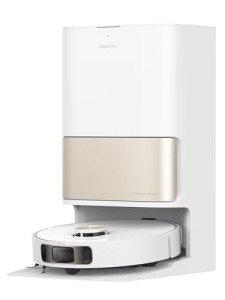Robot Vacuum Cleaner Comparison 101: The Ultimate Guide For Beginners

Robotic Vacuum Cleaner Comparison: The Future of Home Cleaning
Recently, robotic vacuum cleaners have actually transformed the way we keep tidiness in our homes. With advancements in technology and the incorporation of artificial intelligence, these gadgets have evolved from mere novelty items to vital family devices. This post supplies a detailed comparison of a few of the leading robotic vacuum on the market, assisting consumers make notified choices when selecting a design that matches their requirements.
Understanding Robotic Vacuum Cleaners
Robotic vacuum cleaners are self-governing makers designed to clean floors automatically. Geared up with sensing units, they browse around obstacles and adjust their cleaning paths for maximum performance. The key functions that distinguish various designs consist of suction power, battery life, app connection, navigation innovation, and price.
Key Features to Consider
When comparing robotic vacuum cleaners, potential purchasers must consider the following elements:
- Suction Power: Measured in Pascals (Pa), suction power identifies the efficiency of picking up dirt and debris.
- Battery Life: The length of time a vacuum can operate before needing a recharge substantially affects its cleaning performance.
- Navigation Technology: Models might utilize basic random navigation or advanced mapping innovations (like LIDAR) that enable them to produce a map of the home.
- Smart Features: Connectivity to smartphone apps or smart home systems can enhance use and control.
- Filter Type: HEPA filters are suggested for allergy patients, as they trap allergens and enhance air quality.
Comparison of Top Robotic Vacuum Cleaners
Below is a comparison table of some of the best robotic vacuum cleaners readily available in 2023:
| Model | Suction Power (Pa) | Battery Life (minutes) | Navigation Technology | Smart Features | Price (GBP) |
|---|---|---|---|---|---|
| iRobot Roomba i7+ | 1700 | 75 | Smart mapping | App control, voice command | ₤ 949 |
| Roborock S7 | 2500 | 180 | LIDAR | App control, multi-floor | ₤ 649 |
| Neato D7 | 2000 | 120 | LIDAR | App control, zone cleaning | ₤ 599 |
| Ecovacs Deebot T10 | 3000 | 150 | Smart mapping | App control, space detection | ₤ 799 |
| Shark IQ Robot | 1200 | 90 | Random | App control, self-emptying | ₤ 399 |
Explanation of the Table
- iRobot Roomba i7+: Known for its robust cleaning ability, it includes smart mapping technology that allows it to designate specific areas for cleaning. best floor vacuum robot -emptying function is a plus for convenience.
- Roborock S7: This model masters suction power and battery life, making it perfect for bigger homes. Its LIDAR innovation helps create an efficient cleaning path, and it can vacuum and mop at the same time.
- Neato D7: The D-shape style permits much better corner cleaning, and it features strong suction power. Its LIDAR navigation allows it to draw up cleaning areas properly.
- Ecovacs Deebot T10: Boasting the highest suction power and advanced navigation, this model can manage multiple floorings successfully. It's a flexible option for households with varying floor types.
- Shark IQ Robot: A budget-friendly option that still provides smart functions. Its self-emptying ability and app integration make it a practical choice for those looking for a solid cleaning buddy without breaking the bank.
Benefits of Robotic Vacuum Cleaners
Robotic vacuum use many advantages that add to their increasing appeal amongst consumers:
- Time-Saving: Automated cleaning enables users to free up important time that can be spent on other activities.
- Convenience: Many designs can be scheduled by means of apps to clean at specific times, lowering manual effort.
- Availability: They can reach under furnishings and in tight areas where conventional vacuums might struggle.
- Daily Maintenance: Regular use of robotic vacuums can help preserve a regularly tidy environment, promoting better total home hygiene.
Frequently Asked Questions About Robotic Vacuum Cleaners
1. How often should I run my robotic vacuum?
It is suggested to run the robotic vacuum at least 2-3 times a week to maintain cleanliness, though daily usage can be beneficial, specifically in homes with animals or high foot traffic.
2. Do robotic vacuums work on carpets?
Yes, lots of robotic vacuums are created to work on carpets, however effectiveness may differ based upon the model's suction power and brush type. Search for designs specifically pointed out as effective for carpets.
3. Can robotic vacuums clean animal hair?
A lot of robotic vacuums can effectively select up pet hair, but those with strong suction and tangle-free brush designs are especially well-suited for this task.
4. How do I preserve my robotic vacuum?
Regular maintenance includes cleaning the brushes and sensing units, clearing the dustbin, and periodically replacing filters to ensure optimal performance.
5. Are robotic vacuums worth the financial investment?
While they tend to be more expensive than conventional vacuums, the convenience, performance, and time-saving aspects make them a deserving investment for many households.
The market for robotic vacuum cleaners continues to expand as technology progresses, providing consumers a range of choices to match different cleaning needs and budget plans. By thoroughly thinking about functions such as suction power, battery life, and smart capabilities, users can choose a design that lines up with their lifestyle. Whether for convenience, ease of use, or superior cleaning performance, robotic vacuums are unquestionably reshaping the future of home cleaning.

